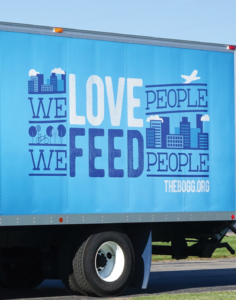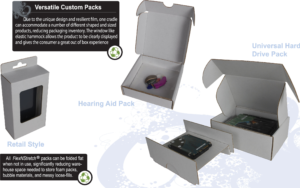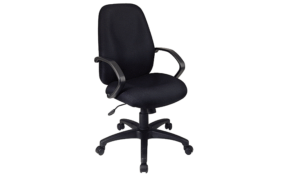
BOGG Ministries – A Cool Solution to Safely Feed Families
 Challenge: Deliver safe, fresh food to families in need while meeting industry regulations
Challenge: Deliver safe, fresh food to families in need while meeting industry regulations
Action: Donate accurate, easy-to-use LOG-IC® 360 Bluetooth Loggers for temperature monitoring
Results: Maintained compliance and prevented delivery of compromised food
Each day brings a major question for far too many families in the Miami Valley: Where will we find the next meal? The issue is complex, but it’s one that Jason Barton and Jason Johnston knew needed to be addressed in a big way.
Together, they co-founded the non-profit BOGG (Because of God’s Grace) Ministries and began the difficult task of feeding Dayton’s hungry families. Their idea was simple: set up mobile food pantries (lovingly known as Mobile Meals) in the community to give out a free meal and a weeks’ worth of groceries to anyone, no questions asked.
What started as a small service, feeding four families a week, has now exploded into an incredible operation that delivers food to more than 1,500 people throughout the Dayton region each month.
More than simply distributing groceries, BOGG is determined to provide fresh, safe food to every guest. For perishable items, that means staying compliant with the same high standards set for the food service industry regarding temperature monitoring. To meet these regulations, temperatures had to be taken twice hourly with an IR gun during hours of operation and recorded in a paper log.
This process presented a few hurdles for BOGG. With storing and transporting so much food, temperature checks were a tedious, time-consuming task for the team of volunteers.
Another problem was found in the IR guns used to take temperature readings; results were not as accurate as needed. To make matters worse, the fine folks at BOGG soon learned that any two IR guns could produce varied readings and contradicting results.
Knowing BOGG needed to find a better way to stay compliant, and supportive of the great work they were doing in the Dayton community, ASAP and their partner manufacturer, ATI, offered a solution: LOG-IC® 360 Bluetooth Loggers.
With the LOG-IC® 360 Bluetooth Loggers installed in every truck and at their facility, BOGG could accurately monitor temperatures around the clock and easily download logs to a smartphone. Working with our manufacturing partner, American Thermal Instruments, we donated enough LOG-IC® 360 Bluetooth Loggers to meet BOGG’s needs.
In a twist of fate, the loggers were proven valuable in short order. One night, the refrigeration unit on a delivery truck malfunctioned, exposing the food to improper temperatures for nine hours. The next morning, the refrigeration unit began working again and re-cooled the food. The incident would have gone unnoticed if not for the log that was downloaded from the LOG-IC® 360 Bluetooth Loggers the following day, showing the food had endured a temperature breech.
The catch helped BOGG prevent the shipment of compromised food from being delivered to 150 families.
With the LOG-IC® 360 Bluetooth Loggers, BOGG has a simple, effective way to stay compliant and peace of mind. We’re happy to have been able to help BOGG and their mission to provide safe food to families in need.
To learn more about BOGG Ministries or to volunteer, please visit www.thebogg.org/volunteer.
Preventing Automotive Aftermarket Part Damage

Challenge: Reduce damage to car radios during shipping and introduce retail-friendly packaging
Action: Get new packaging approved thru Japan
Results: Reduced breakage ratio by an estimated 40%
A 2nd tier automotive partner for Honda needed help solving a problem of shipping radios to the aftermarket industry. Previously, radios were bound in bubble wrap, thrown into a box, and shipped. As a result of this haphazard approach, the radios were suffering damage in shipment.
ASAP proposed a brand new packaging innovation called Flex N Stretch: a specially engineered clear sheet of film that is attached to a piece of corrugated board and suspends the item within a box. We demonstrated a few samples to the team by throwing the box against the wall. The radio did not move and was unharmed.
Because this was a brand new packaging solution, the concept needed to be approved by the leaders of Honda in Japan. After a few months of rigorous vetting, we received approval. Over the next four years, we provided 1,400 inserts and boxes per month to ship the products. The packaging was a resounding success, with only one broken car radio during the four-year period.
Solving Customer’s Breakage Challenges

Challenge: Casters on office chairs breaking during transit
Action: Get to the manufacturing line
Results: Improved damage ratio so successfully that the process is still in place after 10 years
On a routine visit to check on service and delivery times, I was asked by my purchasing contact to meet with a few engineers to discuss a possible solution for product damage issues that were occurring in transit—the casters on chairs were breaking.
The meeting, which had already started around the actual production line, was in full swing. Ideas were flowing but many of the solutions I heard seemed over-engineered and very expensive. Being a longtime vendor, the group asked me if I had any bright ideas. Off the top of my head, I suggested a simple and inexpensive solution I thought might work. After explaining my idea, I looked around the group and saw a bunch of stunned faces.
The idea was this: Take a flat corrugated pad, glue 4 of the appropriate length and diameter mailing tubes on each corner, and place it in the bottom of the box. The chair would then be place in the box on top of the tubes. By doing this, the casters would be suspended, decreasing pressure and strain on each and reducing the possibility of one being broken in transit.
Best of all, the cost for each footer was under $2 each, saving the company huge amounts in returns and replacements. The idea was so successful that they have used thousands to date.
It goes to show that sometimes the best solutions are the simplest.
